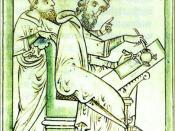The philosophical discussion begins as Cebes brings up Socrates' Theory of Recollection, which claims that all learning is recollection. Simmias cannot quite remember the proof of that theory, and asks for an explanation. Socrates begins by pointing out that we can be reminded of one thing by being made conscious of another thing. For instance, if one sees a lyre or an article of clothing that belongs to a beloved, one will immediately be reminded of the person whose lyre or clothing it is.
Socrates now re-introduces the Theory of Forms, making Simmias agree that there is such a thing as Equality itself--something that is independent of any particular case of equality such as equal sticks or equal stones. We know this Form of Equality, because it comes into our minds every time we see instances of equal objects. However, Socrates points out, equal stones or equal sticks may look equal from one point of view and unequal from another.
Nonetheless, we would never be tempted to suggest that Equality itself is unequal. Therefore, the sticks or stones that are equal cannot be the same thing as Equality, since they can sometimes be unequal, and Equality itself never can be. If the equal things are different from Equality and yet can bring Equality into our minds, they must somehow remind us of the Form of Equality. We are aware that the sticks or stones fall short of being perfectly equal, but to be aware that they fall short, we must already have an idea of what it means to be perfectly equal; that is, we must already know the Form of Equality.
We become aware of the equal sticks and stones through our senses, and similarly sense their deficiency with respect to true Equality. There are no...


